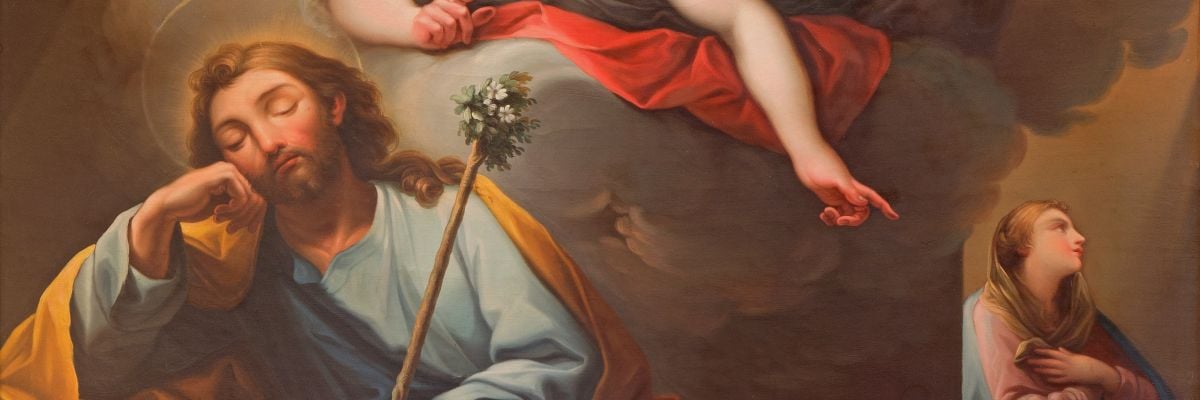
“The angel of the Lord appeared to him in a dream” (Matt. 1:20).
Saint Joseph was a good sleeper—good enough that God used his sleep and his dreams in order to direct him. This is a very significant fact, and tells us a lot about him.
The Desert Fathers and the great theologians of the Church like St. Thomas Aquinas tell us that our dreams reflect the state of our passions and emotions. When a person is of high sanctity, or a deep simplicity of heart, his dreams are clearer and safer guides than for the rest of us, whose dreams are usually quite a mix of whatever is churning inside for good or ill.
Thus, in the Church’s hymn for Compline, or “night prayer,” we pray to be delivered from any deceptions coming from the devil playing games with our unguarded imagination as we sleep. It is good general advice to avoid looking for meaning and direction from our dreams, even if they are interesting and do tell us something. “But what?” is the question.
St. Joseph was so pure and so attuned to the things of God, however, that he could receive direction in his slumber. For him there was no question; the meaning was clear, even if a bit demanding or difficult, like fleeing to a foreign land, or moving back to Galilee. St. Matthew’s gospel has four places that refer to the dreams and sleep of St. Joseph. The one from the gospel today is the most important, and it is sometimes called “the Annunciation to St. Joseph” as a parallel to the Annunciation to Our Lady.
It is not surprising, then, that when devotion to St. Joseph began to grow more and more widespread and explicit, Catholic art and piety reflected more deeply on his sleep. There are many paintings and even statues from the seventeenth and eighteenth centuries of this annunciation dream of St Joseph. One was on display at the San Diego Museum of Art’s recent exhibit of art of the Spanish Empire. It just so happens that the Holy Father, Pope Francis, has a particular devotion to the “Sleeping St Joseph.” The pope has on his desk a statue of St. Joseph with a little drawer in its base, and when he has a special intention he writes it down and places it in the drawer, asking St. Joseph to “dream” of his petition before God. This devotion has begun to spread throughout the Church, as recent catalogues indicate.
Here is a suggestion: Follow the Holy Father’s example and entrust your intentions to the care of St. Joseph. We sometimes say of our difficult decisions that we will “sleep on it.” So, if you let St. Joseph sleep on your petitions, there is no doubt you will benefit greatly. St. Teresa of Avila tells us that she was never disappointed when she asked the intercession of St. Joseph. And why not? God the Father himself entrusted his own beloved Son and his spotless Mother to the care of St. Joseph. We should do no less regarding the persons dear to our hearts. We will then see the great mystery of God’s care for us begin to unfold.
In particular, let us not omit to entrust the Holy Father to St. Joseph, that he may be guided along the right path in this very dangerous world.
As we confide in St. Joseph, however, we must also imitate his patience. God will give us what we need in his own good time. As that great devotee of St. Joseph Blessed Solanus Casey used to say, we can “thank God ahead of time” for his goodness to each of us, to the Holy Father, and to the whole Church, of which St. Joseph is the patron. In his fidelity, we find a living example of the words from the Song of Songs, written by his great and wise ancestor, “I slept, but my heart was awake” (5:2). Let’s find out what he meant by that in our own time.



